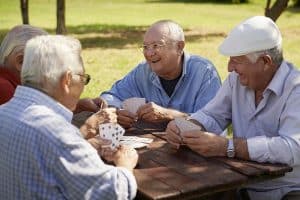 We as a society often forget that older adults share many of the same needs as younger people. Those needs include feeling a sense of accomplishment, enjoying family and friends, experiencing excitement over new and interesting activities, feeling a sense of purpose through community involvement, etc. Ask any senior about the books they have read, the movies they have seen, the parks they have visited, and trips they have taken, and it’s easy to relate to their enthusiasm. Many elderly people will also look back fondly over their growth and accomplishments from their former jobs and the satisfaction that this brought them. Like anyone else, older adults have a distaste for boredom, isolation, or confinement, as they still have a natural urge to get out and enjoy life to the fullest.
We as a society often forget that older adults share many of the same needs as younger people. Those needs include feeling a sense of accomplishment, enjoying family and friends, experiencing excitement over new and interesting activities, feeling a sense of purpose through community involvement, etc. Ask any senior about the books they have read, the movies they have seen, the parks they have visited, and trips they have taken, and it’s easy to relate to their enthusiasm. Many elderly people will also look back fondly over their growth and accomplishments from their former jobs and the satisfaction that this brought them. Like anyone else, older adults have a distaste for boredom, isolation, or confinement, as they still have a natural urge to get out and enjoy life to the fullest.
Not only do activities and social interaction promote happiness, but they also allow seniors to stay fit and healthy for a longer time compared with those who live a sedentary life at home. As people age, it is important to understand that they also need to socialize with people in their own age group, enjoying activities like swimming, playing games, enjoying book clubs, participating in crafts, and even playing certain sports. When engaged in life, their well-being will continue to be stimulated!
Fortunately, there are retirement communities in Broomfield that offer fun and enriching opportunities such as resident pot-lucks and mixers, cultural events, crafts and games, continued learning classes, lectures, exercise classes and other options for socialization and wellness. This is beneficial to their residents’ health and happiness, in ways that have been proven with research of geriatric health and psychology.
Below are some of the many benefits that socialization provides:
- When cold and flu season arises, individuals who socialize and leave their homes more often are actually less likely to get sick.
- Those who are able to focus on caring for others in simple ways, even by listening to them, have healthier hearts and are less likely to suffer from a heart attack than those who are simply cared for and self-focused.
- People of all ages, especially older adults, have weaker immune systems when isolated from other individuals. Those who are more social are less likely to become ill.
- Individuals who interact with a pet also experience a spike in the strength of their immune system. Caring for plants also has a similar effect, though to a lesser degree.
- Social interaction helps older individuals to retain their memory. As activities and social engagement stimulates the mind, neural pathways stay strong and memories remain accessible.
- Adults who focus on a new skill or hobby, or even maintain an older one, are less likely to develop dementia and have even been shown to experience less severe effects from Alzheimer’s disease.
- Those who interact in a social environment are more likely to get exercise than those who do not. Sitting for long periods of time is bad for anyone who can walk or stand. Seniors who are ambulatory can go for walks, swim, dance, or perform other activities that keep the body fit and healthy.
- Socialization can reduce the effects of arthritis and other conditions. Essentially, new friends and activities distract an individual from the pain or discomfort some conditions can cause.
There are many other reasons why seniors who live in a safe, social environment remain healthy, focused, and engaged in a purposeful life. In summary, socialization can prolong quality of life and overall life expectancy.

